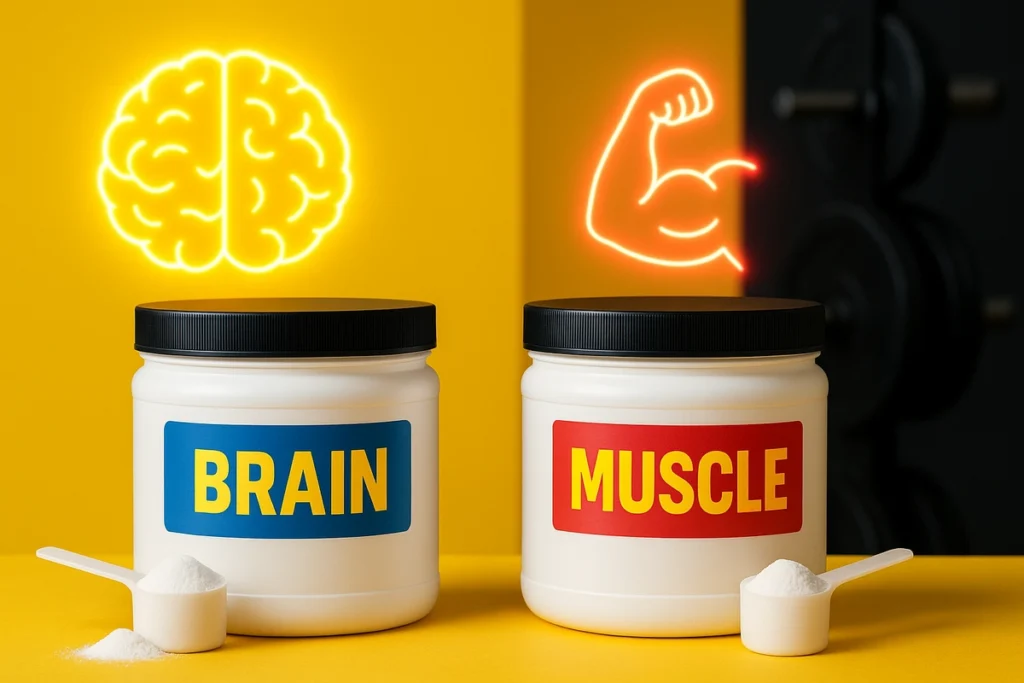Most people think creatine is only for building muscle—but science tells a bigger story. Creatine monohydrate also fuels your brain.
From sharper memory to better focus and reduced mental fatigue, this powerful supplement can upgrade more than just your workouts.
As a fitness coach, I’ve seen firsthand how creatine boosts not only physical strength—but also mental performance, clarity, and resilience.
If you’re serious about your health, it’s time to explore how creatine can help your brain thrive—both in and out of the gym.
Table of contents
- Quick Answer: Does Creatine Help Brain Function?
- What Is Creatine and How Does It Work in the Brain?
- Proven Cognitive Benefits of Creatine Monohydrate
- Who Can Benefit Most from Creatine for Brain Health?
- Brain Health vs. Muscle Health – Is the Dose the Same?
- Real-World Experiences and Anecdotes
- Final Verdict – Is Creatine Worth It for Your Brain?
Quick Answer: Does Creatine Help Brain Function?
Yes—creatine monohydrate isn’t just for gym gains. It supports brain energy metabolism, enhances memory and focus, and helps reduce mental fatigue.
I’ve personally felt the difference, especially during high-stress periods like client programming and long writing sessions. It’s like giving your brain a steady stream of fuel—just like it does for your muscles.
If you’re new to creatine, start with this beginner’s guide to creatine monohydrate for foundational info.
What Is Creatine and How Does It Work in the Brain?
Most people know creatine as a muscle-building supplement, but here’s the thing—it’s also a brain booster.
Creatine plays a key role in producing ATP, the body’s energy currency. Your brain, which consumes a lot of energy, depends heavily on ATP to stay sharp and function efficiently.
When you supplement with creatine, you’re giving your brain a more consistent supply of energy—especially useful during intense mental work or sleep deprivation.
I’ve had evenings where my brain was fried after coaching and content planning. Once I started taking creatine regularly, I could push through with better clarity and mental stamina.
Want to understand how creatine gets absorbed? Read this comparison: Creatine Monohydrate vs HCL.
Proven Cognitive Benefits of Creatine Monohydrate
Let’s break down what creatine can actually do for your brain:
Improved Memory & Recall
Studies show creatine helps with short-term memory—especially for people with low creatine diets like vegetarians. I feel it most during content creation—ideas connect faster and clearer.
Enhanced Focus & Mental Clarity
Whether I’m coaching clients, building training plans, or working on SEO, creatine keeps me locked in. It’s a subtle but powerful effect—like silencing mental noise.
Reduced Mental Fatigue
During Ramadan, I trained and worked on an empty stomach. I still took creatine at night, and unlike previous years, I didn’t experience mental crashes. That energy boost wasn’t just physical—it was mental.
Support During Sleep Deprivation
Amina, a med student client from Dubai, started creatine during her exam season. Despite little sleep, she felt mentally stable and more confident under pressure.
You can read more about how to cycle creatine safely to avoid common pitfalls.
Who Can Benefit Most from Creatine for Brain Health?
Honestly, almost everyone. But some groups benefit more noticeably:
Vegetarians and Vegans
They naturally get less creatine from food. Supplementing fills the gap and gives a noticeable brain boost.
Busy Professionals & Students
Jonas, a finance executive client from Sweden, added creatine to his morning routine. He said it helped beat his 3 PM crash and improved his focus in meetings.
Older Adults
As we age, brain energy production declines. Creatine helps older clients stay alert, sharp, and mentally engaged.
Worried about hair loss? Here’s the truth: Creatine and Hair Loss – Myth or Fact
Brain Health vs. Muscle Health – Is the Dose the Same?

Yes—5 grams per day works great for both brain and body.
That’s exactly what I take. I don’t do loading phases anymore—I just stay consistent. I take micronized creatine monohydrate with my post-workout shake, or with breakfast on rest days.
Even on rest days, I notice better mental focus. On training days, it’s like my brain shifts into high-performance mode.
If you’re around 80 kg, check out this guide for perfect creatine dosage.
Also, don’t forget water intake—here’s how to stay hydrated on creatine.
Real-World Experiences and Anecdotes
Let me share a few true stories:
My Own Experience
As a coach, I spend hours training, writing, and building SEO plans. I used to hit a mental wall by late afternoon. But since taking creatine daily, I stay clear-headed—without needing extra caffeine.
Jonas – Finance Executive (Sweden)
He started creatine for gym performance. But within a week, he noticed better mental clarity at work. Emails were sharper, his mood was better, and he could power through long meetings.
Amina – Med Student (Dubai)
During exam season, sleep was rare. She added creatine to her study routine and told me it helped her focus longer without burning out. The mental endurance was real.
If you’re wondering about water weight, here’s a reality check: Creatine and Water Retention – Myth?
Final Verdict – Is Creatine Worth It for Your Brain?
Absolutely.
Whether you’re lifting weights or mental loads, creatine delivers. It’s science-backed, safe, and affordable. More importantly—it works.
From my experience and my clients’ stories, I can say creatine is one of the few supplements I fully trust and recommend for both brain and body.
Thinking about combining it with a mass gainer? Here’s my advice: Is Mass Gainer With Creatine Worth It?
If you’re ready to level up mentally, not just physically—creatine is a no-brainer.



Leave a Reply